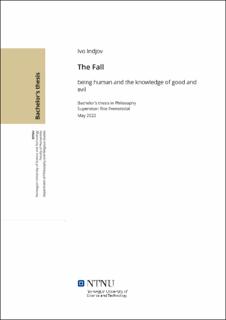| dc.description.abstract | I dette essayet argumenterer jeg for at mennesker (Adam og Eva) før og etter syndefallet var forskjellige av natur. Dette antyder en annen respons og tolkning av den bibelske historien og dens konsekvenser. Jeg forsøker å svare på spørsmålet om hva det betyr å være ute av stand til å danne og opprettholde moralske verdier og standarder. Mitt hovedargument er at manglende evne til å kjenne godt og ondt ikke kommer alene, men også har en innvirkning på andre slutningssystemer som er ansvarlige for blant annet beslutningstaking, følelser og rasjonalitet. Noen av disse har lenge vært sett på som essensielle kjennetegn ved å være menneske, og lignende synspunkter opprettholdes den dag i dag. For å forsvare tesen min vender jeg meg til de filosofiske tradisjonene om menneskets natur og deres tilknytning til de teologiske tolkningene av den bibelske historien om syndefallet. Målet med oppgaven min er ikke å bevise eller motbevise skriftene, men å foreta en analyse av dem med sikte på objektivitet. I tillegg støtter jeg min påstand med argumenter fra moderne empiriske studier om menneskets hjernefunksjon. Avslutningsvis utfordrer jeg den klassiske tolkningen at ondskap og lidelse er en konsekvens av menneskenes fri vilje, og antyder at det fører til en logisk motsetning. | |
| dc.description.abstract | In this essay, I argue that humans (in particular Adam and Eve) before and after the Fall were distinct in nature. This inevitably suggests a different response and interpretation of the biblical story and its consequences. The question of what it means to be unable to form and maintain moral values and standards is a difficult one to answer, but not impossible to do to a grade beyond mere speculations. My main argument is that the incapability of knowing good and evil doesn’t come alone, but has also an impact on other inference systems responsible for, among other things, decision making, emotions, and rationality. Some of these have long been seen as essential characteristics of being human and similar views are sustained to the present day. To defend my point, I rely on the philosophical traditions concerning human nature and their connection to theological interpretations of the biblical story of the Fall. The goal of my thesis is not to prove or disprove the scriptures, but to make an argumentative analysis of them with an approach compliant with the principle of charity that aims at objectivity. Additionally, I support my claim with arguments from contemporary empirical studies on the functioning of the human brain. In conclusion, I challenge the classical dependence of evil on free will, suggesting that it leads to a logical contradiction. Seen from this perspective, questions around the justification of the punishment emerge and are to be assessed thoroughly in the future. | |
